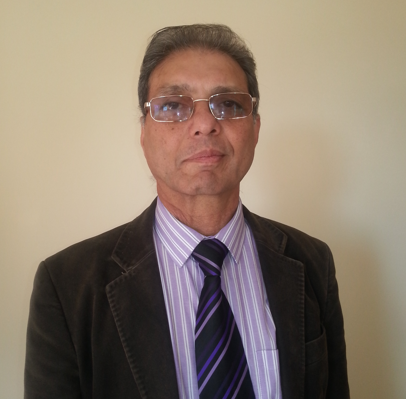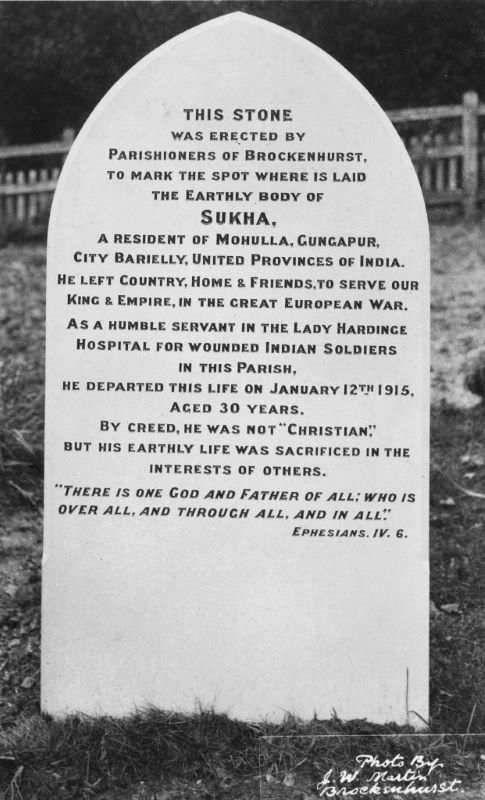Sukha- A Forgotten Dalit Soldier Buried in the English Churchyard
-Arun Kumar, Bedford, UK
SAMAJ WEEKLY, UK
Sukha’s story is a sad account of the hard reality of India’s caste prejudice. A Dalit soldier was discriminated even after his death. Such behaviour of his fellow countrymen put whole of humanity to shame. Caste is a centuries old discrimination on the basis of birth and occupation that impacted and traumatised millions of people. Dr Manmohan Singh, former Prime Minister of India had rightly termed it as a ‘blot on humanity’.[1] It is a tragedy that Indians’ mind set hasn’t changed even today and caste is still being practiced.

At the beginning of the World War I, millions of Indians were enrolled in the British army. More than one million Indian soldiers were involved overseas in the campaign against fascism and defend democracy. Hindus, Sikhs and Muslims from various regions such as Punjab, Uttar Pradesh, Maharashtra, Tamil Nadu and other states volunteered themselves and fought on the Western Front, in East Africa, Mesopotamia, Egypt and Gallipoli. One third of the British army on the Western Front came from India. Overall it contained 20,748 British and 89,335 Indian soldiers sent from sub-continent, supported by 49,273 Indian labourers.[2] It is obvious that majority of the labourers were from lower castes called untouchables doing cleaning, washing and other menial work. Volunteering in the army offered Untouchables an opportunity to improve their economic conditions as soldiers were paid well and also to break through the caste barriers. One of them was Sukha, a 30 year old Untouchable from a village in Uttar Pradesh who volunteered enthusiastically when the call came for recruits to serve in the army.
Sukhha was posted in France. There was a fierce fighting on the Western Front and over 60,000 soldiers died and a great numbers were injured. The wounded soldiers were transferred to England and hospitalised in the military hospitals in Brighton where the Royal Pavilion was converted into a hospital and in the Lady Hardinge Hospital in the historical village Brockenhurst, New Forest District in Hampshire. In case a soldier died, there is a cemetery at Brookwood near Woking where Muslim soldiers were buried and the Chhatri memorial on Patcham Downs near Brighton marks the ghats where Hindus and Sikhs were cremated.[3]
Sukha was transferred from France to Lady Hardinge Hospital in Brockenhurst as a cleaner. Here he was called Sukha Kala or Sukha Kaloo (Kala means black used as contempt). He was probably a dark skinned man and the name was given to remind him of his low status. He had a first name without any surname as at that time the Untouchables didn’t merit a surname.
While serving in the hospital, Sukha became ill with pneumonia and died on 12 January, 1915. Now the unthinkable happened. His Hindu, Sikh and Muslim compatriots refused to accept his body. As he was an Untouchable, he couldn’t be buried in a Muslim graveyard and cremated in Hindu crematorium. His body was lying unclaimed in the hospital. “They had asked the Hindus to cremate him in Patcham near Brighton, but they refused to do it because he was of low caste. Then they asked the Muslims to bury him, but the imam of Woking Mosque said he was not a Muslim, so they couldn’t bury him. Sukha was quite literally lying in no-man’s land, rejected by his own countrymen,” said historian Shrabani Basu, author of ‘For King and Another Country: Indian Soldiers in the Western Front 1914-18.[4] On hearing about Sukha’s unclaimed body, Arthur Chambers, the Vicar of St. Nicholas Church, Brockenhurst said that Sukha had sacrificed his life for the British and should be given a respectful burial. He arranged for him to be buried in his church. To pay him respect the headstone on the grave of Sukha was bought by donations from the residents of the village. The inscription on the headstone says:
“THIS STONE WAS ERECTED BY / PARISHIONERS OF BROCKENHURST / TO MARK THE SPOT WHERE IS LAID / THE EARTHLY BODY OF SUKHA / A RESIDENT OF MOHULLA, GUNGAPUR, / CITY BAREILLY, UNITED PROVINCES, INDIA / HE LEFT COUNTRY, HOME AND FRIENDS, TO SERVE OUR KING & EMPIRE, IN THE GREAT EUROPEAN WAR, / AS A HUMBLE SERVANT IN THE LADY HARDING / HOSPITAL FOR WOUNDED SOLDIERS / IN THE PARISH, / HE DEPARTED THIS LIFE ON JANUARY 12TH 1915 / AGED 30 YEARS. / BY CREED HE WAS NOT A CHRISTIAN / BUT HIS EARTHLY LIFE WAS SACRIFICED IN THE / INTERESTS OF OTHERS. / “THERE IS ONE GOD AND FATHER OF ALL AND THROUGH ALL AND IN ALL” / EPHESIANS IV.6
Had there was no headstone on Sukha’s grave, his sacrifice and his name would have been erased from the pages of history as his other thousands of untouchable fellow soldiers who gave their lives in the same war. Thanks to the generous act of the vicar of Brockenhurst who gave him a decent burial and put a headstone in his memory.
A myth has been created that only Sikhs, Hindus and Muslims lost their lives in the war efforts and Dalits appear nowhere. Indian historians didn’t consider worthy of mentioning the sacrifices of Dalit soldiers. Even in the war memorials, there is no mention of Dalit soldiers. Perhaps they were counted as Hindus, Sikhs or Muslims. Tributes are paid to those who laid down their lives but the sacrifices of Dalits are overlooked.
On 16 October, 2018, British Organisation for People of Asian Origin (BOPA) organised a Remembrance Day of Commonwealth contribution to the British Armed Forces on ‘the 100th Anniversary of World War-1 coming to an end’ at the National Memorial Arboretum, Burton on Trent, Staffordshire. Over 800 people including Lord Lieutenants, Peers from House of Lords, Members of Parliament, senior officers from British Army, Royal Air Force, Royal Navy, Lord Mayors, foreign dignitaries from Commonwealth countries, community leaders, and youth from schools, colleges, universities attended. In 2018, Bheema Koregaon caught World attention as there was an attack on Dalits celebrating 200 year anniversary of the victory of Mahar soldiers over Marathas. It was felt that soldiers died in the Bheema Koregaon should also be remembered. With the efforts of General Secretary of BOPA, Devinder Prasad (former General Secretary of CasteWatch UK), I had an opportunity to talk on Dalit contribution to British Army. It was the first time when this issue was raised on a public platform. In my short talk, I brought out the sacrifice of Sukha and his ill-treatment even after his death. I pointed out how East India Company extended its control over India by recruiting Dalits in the army as initially caste Hindus were not prepared to do menial work and join the armed forces. Dalit soldiers helped the company to win many battles including Bheema Koregaon. After 1857, British Army set up a number of regiments from Dalits. In Punjab, Ravidasi and Mazhabi Sikh regiments were commissioned in late nineteenth century and after WW2, it was converted into Sikh Light Infantry. Similarly Chamar and Mahar Regiments played a pivotal role in the war efforts but their contribution is totally ignored. Mayor of Litchfield appreciated raising this issue and expressed his ignorance about the Dalit participation in the war efforts. Now it is time to recognise the sacrifices of Dalit soldiers in the war efforts. More research is needed on the Dalit’s involvement in the armed forces and their sacrifices. Dalit contribution was not less than anyone else. Dalit organisations should also take responsibility and initiate a project to have a memorial honouring Dalit soldiers. A memorial in honour of Sikh soldiers has already been unveiled at National Memorial Arboretum with donations from Sikh community. If we are able to erect a pillar in memory of Dalit soldiers, it would be a great inspiration and a matter of pride for our coming generations.
[1] PM’s speech at the Dalit- Minority International Conference : Speeches : Prime Minister of India – Dr. Manmohan Singh (May 22, 2004 – 26th May 2014) (archivepmo.nic.in)
[2] George Morton Jack, The Indian Army on the Western Front, 1914-15: A Portrait if Collaboration The Indian Army on the Western Front, 1914–1915: A Portrait of Collaboration on JSTOR
[3] The memorial to Sukha, an Indian army sweeper, at Brockenhurst – Church Monuments Society
[4] Indian Soldier: Moving tale of an Indian soldier buried in an English churchyard – Times of India (indiatimes.com)









